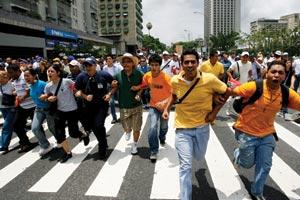Estimados Amigos, Empresarios, Gerentes, Científicos, Beneficiarios en General de la LOCTI,
En conjunto con Espiñeira, Sheldon y Asociados, Firma miembro de PricewaterhouseCoopers nos complace en invitarlos al “FORO: Nuevos escenarios bajo la Reforma de la Ley Orgánica de Ciencia, Tecnología e Innovación".
Este Foro tiene por objeto informar a nuestros clientes y relacionados sobre la Ley de Reforma de la Ley Orgánica de Ciencia, Tecnología e Innovación (LOCTI), la cual entró en vigencia el 16 de diciembre de 2010.
El evento se realizará el próximo viernes 28 de enero de 7:30 AM a 12:00 M. en nuestros Salones de Adiestramiento de Caracas, Avenida Principal de Chuao con Calle la Güairita, Edificio del Rio. Y el 08 de febrero en Valencia.
En el Foro serán analizados los aspectos más importantes de la Reforma de la LOCTI; el marco regulatorio, el régimen sancionatorio y las posibles defensas; asimismo, será desarrollado el tema de cómo abordar la Reforma de la Ley (Se anexa programa).
Estos temas serán expuestos por Elis Aray, socio de la Línea de Servicios de Asesoría Fiscal de Espiñeira, Sheldon y Asociados, Licett Galietta, asociada del Escritorio Jurídico Benson, Peréz Matos, Antakly & Watts y Javier Martínez, CEO de INNOVATEK.
Dada la relevancia del tema a desarrollar en este evento, esperamos contar con su valiosa presencia. Para hacer su reservación por favor comuníquese por el teléfono (0212) 700.62.77 o por la dirección electrónica: maria.araujo@ve.pwc.com. Los cupos son limitados.
Los esperamos.
@HackerGerencial
Programa:
En conjunto con Espiñeira, Sheldon y Asociados, Firma miembro de PricewaterhouseCoopers nos complace en invitarlos al “FORO: Nuevos escenarios bajo la Reforma de la Ley Orgánica de Ciencia, Tecnología e Innovación".
Este Foro tiene por objeto informar a nuestros clientes y relacionados sobre la Ley de Reforma de la Ley Orgánica de Ciencia, Tecnología e Innovación (LOCTI), la cual entró en vigencia el 16 de diciembre de 2010.
El evento se realizará el próximo viernes 28 de enero de 7:30 AM a 12:00 M. en nuestros Salones de Adiestramiento de Caracas, Avenida Principal de Chuao con Calle la Güairita, Edificio del Rio. Y el 08 de febrero en Valencia.
En el Foro serán analizados los aspectos más importantes de la Reforma de la LOCTI; el marco regulatorio, el régimen sancionatorio y las posibles defensas; asimismo, será desarrollado el tema de cómo abordar la Reforma de la Ley (Se anexa programa).
Estos temas serán expuestos por Elis Aray, socio de la Línea de Servicios de Asesoría Fiscal de Espiñeira, Sheldon y Asociados, Licett Galietta, asociada del Escritorio Jurídico Benson, Peréz Matos, Antakly & Watts y Javier Martínez, CEO de INNOVATEK.
Dada la relevancia del tema a desarrollar en este evento, esperamos contar con su valiosa presencia. Para hacer su reservación por favor comuníquese por el teléfono (0212) 700.62.77 o por la dirección electrónica: maria.araujo@ve.pwc.com. Los cupos son limitados.
Los esperamos.
@HackerGerencial
Programa:

